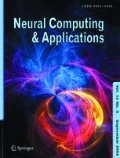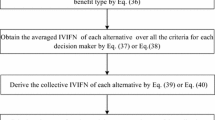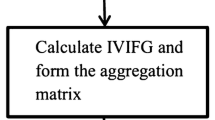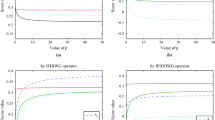Abstract
Intuitionistic fuzzy sets (IFSs) are a very efficient tool to depict uncertain or fuzzy information. In the course of decision making with IFSs, intuitionistic fuzzy aggregation operators play a very important role which has received more and more attention in recent years. This paper proposes a family of intuitionistic fuzzy Einstein hybrid weighted operators, including the intuitionistic fuzzy Einstein hybrid weighted averaging operator, the intuitionistic fuzzy Einstein hybrid weighted geometric operator, the quasi-intuitionistic fuzzy Einstein hybrid weighted averaging operator, and the quasi-intuitionistic fuzzy Einstein hybrid weighted geometric operator. All these newly developed operators not only can weight both the intuitionistic fuzzy arguments and their ordered positions simultaneously but also have some desirable properties, such as idempotency, boundedness, and monotonicity. Based on these proposed operators, two algorithms are given to solve multi-criteria single-person decision making and multi-criteria group decision making with intuitionistic fuzzy information, respectively. Two numerical examples are provided to illustrate the practicality and validity of the proposed methods and aggregation operators.
Similar content being viewed by others
References
Atanassov K (1986) Intuitionistic fuzzy sets. Fuzzy Sets Syst 20(1):87–96
Chen SM, Tan JM (1994) Handling multicriteria fuzzy decisionmaking problems based on vague set theory. Fuzzy Sets Syst 67:163–172
Choquet G (1954) Theory of capacities. Ann Inst Fourier 5:131–295
Dempster AP (1967) Upper and lower probabilities induced by a multivalued mapping. Ann Math Stat 38(2):325–339
Deschrijver G, Kerre E (2002) A generalization of operators on intuitionistic fuzzy sets using triangular norms and conorms. Notes Intuit Fuzzy Sets 8(1):19–27
Dyckhoff H, Pedrycz W (1984) Generalized means as model of compensative connectives. Fuzzy Sets Syst 14(2):143–154
Fodor J, Marichal JL, Roubens M (1995) Characterization of the ordered weighted averaging operators. IEEE Trans Fuzzy Syst 3:236–240
Hájek P (1998) Metamathematics of fuzzy logic. Kluwer, Dordrecht
Hardy GH, Littlewood JE, Pólya G (1934) Inequalities. Cambridge University Press, Cambridge
Hong DH, Choi CH (2000) Multicriteria fuzzy decision-making problems based on vague set theory. Fuzzy Sets Syst 14:103–113
Klement EP, Mesiar R, Pap E (2004) Triangular norms. Position paper I: basic analytical and algebraic properties. Fuzzy Sets Syst 143(1):5–26
Liao HC, Xu ZS (2014) Intuitionistic fuzzy hybrid weighted aggregation operators. Int J Intell Syst 29(11):971–993
Lin J, Jiang Y (2014) Some hybrid weighted averaging operators and their application to decision making. Inf Fusion 16:18–28
Qin JD, Liu XW (2014) An approach to intuitionistic fuzzy multiple attribute decision making based on Maclaurin symmetric mean operators. J Intell Fuzzy Syst 27:2177–2190
Tan CQ, Chen XH (2010) Intuitionistic fuzzy Choquet integral operator for multi-criteria decision making. Expert Syst Appl 37(1):149–157
Wang W, Liu X (2012) Intuitionistic fuzzy information aggregation using Einstein operations. IEEE Trans Fuzzy Syst 20:923–938
Wang WZ, Liu XW (2011) Intuitionistic fuzzy geometric aggregation operators based on Einstein operations. Int J Intell Syst 26:1049–1075
Wang TC, Lee HD (2009) Developing a fuzzy TOPSIS approach based on subjective weights and objective weights. Expert Syst Appl 36:8980–8985
Wang YM, Yang JB, Xu DL (2005) Interval weight generation approaches based on consistency test and interval comparison matrices. Appl Math Comput 167:252–273
Wei G (2010) Some induced geometric aggregation operators with intuitionistic fuzzy information and their application to group decision making. Appl Soft Comput 10(2):423–431
Xia MM, Xu ZS (2010) Generalized point operators for aggregating intuitionistic fuzzy information. Int J Intell Syst 25(11):1061–1080
Xia MM, Xu ZS, Zhu B (2012) Some issues on intuitionistic fuzzy aggregation operators based on Archimedean t-conorm and t-norm. Knowl-Based Syst 31:78–88
Xia MM, Xu ZS, Zhu B (2012) Generalized intuitionistic fuzzy Bonferroni means. Int J Intell Syst 27:23–47
Xia MM, Xu ZS, Zhu B (2013) Geometric Bonferroni means with their application in multi-criteria decision making. Knowl Based Syst 40:88–100
Xu ZS (2007) Intuitionistic fuzzy aggregation operators. IEEE Trans Fuzzy Syst 15(6):1179–1187
Xu ZS (2010) Choquet integrals of weighted intuitionistic fuzzy information. Inf Sci 180(5):726–736
Xu ZS (2011) Approaches to multiple attribute group decision making based on intuitionistic fuzzy power aggregation operators. Knowl Based Syst 24(6):749–760
Xu ZS, Cai X (2010) Recent advances in intuitionistic fuzzy information aggregation. Fuzzy Optim Decis Making 9(4):359–381
Xu ZS, Xia MM (2011) Induced generalized intuitionistic fuzzy operators. Knowl-Based Syst 24(2):197–209
Xu ZS, Yager RR (2006) Some geometric aggregation operators based on intuitionistic fuzzy sets. Int J Gen Syst 35:417–433
Xu ZS, Yager RR (2008) Dynamic intuitionistic fuzzy multi-attribute decision making. Int J Approx Reason 48(1):246–262
Xu ZS, Yager RR (2011) Intuitionistic fuzzy Bonferroni means. IEEE Trans Syst Man Cybern B Cybern 41(2):568–578
Yager RR (1988) On ordered weighted averaging aggregation operators in multi-criteria decision making. IEEE Trans Syst Man Cybern 18:183–190
Yager RR, Filev DP (1999) Induced ordered weighted averaging operators. IEEE Trans Syst Man Cybern B Cybern 29(2):141–150
Yu DJ (2013) Intuitionistic fuzzy geometric Heronian mean aggregation operators. Appl Soft Comput 13(2):1235–1246
Yu DJ (2014) Intuitionistic fuzzy information aggregation under confidence levels. Appl Soft Comput 19:147–160
Yu XH, Xu ZS (2013) Prioritized intuitionistic fuzzy aggregation operators. Inf Fusion 14:108–116
Zadeh LA (1965) Fuzzy sets. Inf Control 8(3):338–353
Zhang ZM (2013) Generalized Atanassov’s intuitionistic fuzzy power geometric operators and their application to multiple attribute group decision making. Inf Fusion 14(4):460–486
Zhao XF, Lin R, Zhang Y (2014) Intuitionistic fuzzy heavy aggregating operators and their application to strategic decision making problems. J Intell Fuzzy Syst 26(6):3065–3074
Zhao XF, Wei GW (2013) Some intuitionistic fuzzy Einstein hybrid aggregation operators and their application to multiple attribute decision making. Knowl-Based Syst 37:472–479
Zhao H, Xu ZS, Ni M, Liu S (2010) Generalized aggregation operators for intuitionistic fuzzy sets. Int J Intell Syst 25(1):1–30
Zhao H, Xu ZS, Yao ZQ (2014) Intuitionistic fuzzy density-based aggregation operators and their applications to group decision making with intuitionistic preference relations. Int J Uncertain Fuzziness Knowl Based Syst 22(1):145–169
Acknowledgments
The author thanks the anonymous referees for their valuable suggestions in improving this paper. This work is supported by the National Natural Science Foundation of China (Grant No. 61375075), the Natural Science Foundation of Hebei Province of China (Grant No. F2012201020) and the Scientific Research Project of Department of Education of Hebei Province of China (Grant No. QN2016235).
Author information
Authors and Affiliations
Corresponding author
Rights and permissions
About this article
Cite this article
Zhang, Z. Multi-criteria group decision-making methods based on new intuitionistic fuzzy Einstein hybrid weighted aggregation operators. Neural Comput & Applic 28, 3781–3800 (2017). https://doi.org/10.1007/s00521-016-2273-0
Received:
Accepted:
Published:
Issue Date:
DOI: https://doi.org/10.1007/s00521-016-2273-0




